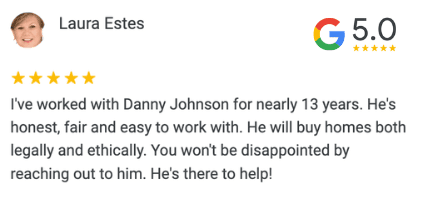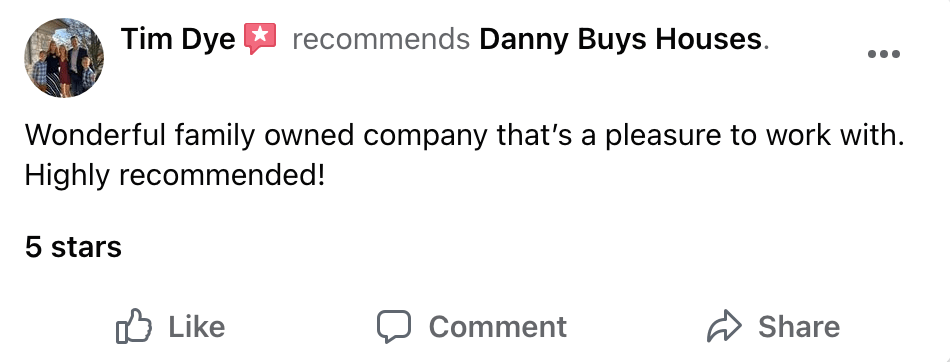
Need to Sell Your Parents' House After They Pass Away? Here's How!
By Danny Johnson | Updated 9/11/2024, 9:01:51 AM
Selling a house after the death of a parent can be hard. Our guide covers the ins and outs to help you through the process.
- Key Takeaways
- What to do when you inherit your parents house?
- Is it better to hold on to your parents' house or sell it?
- Understanding Estate Status and Probate
- What is Probate?
- Living Trusts and Their Benefits
- Transfer on Death Deeds Explained
- Identifying the Estate Executor and Notifying Interested Parties
- Handling Inheritance Disagreements
- Dividing Responsibilities Among Heirs
- Agreeing on Proceeds Distribution
- Seeking Professional Mediation
- Sell parents house after death options
- Option 1: Selling For Sale By Owner
- Option 2: Selling with a Real Estate Agent
- Option 3: Selling to a House Buying Company
- Preparing the House for Sale
- Sorting Through Personal Belongings
- Addressing Necessary Repairs
- Determining Fair Market Value
- Ready To Sell Your Parents' House
🗂 Table of Contents
The death of a parent is hard and can leave us feeling lost and alone. Managing their estate, including selling their home, can feel like a huge task.
Janie G. shared her story with us, "I know this feeling well, having had to sell my parents' house after they passed away. It was a mix of sadness, nostalgia, and uncertainty."
"Terms like estate planning, probate, and inheritance became important to me. The probate process and selling their property was stressful and confusing. But, I learned a lot about the process of selling inherited property, like how home selling as is can be done with a house buying company, that I wish I knew earlier."
Let's walk through what may be involved for you to sell the home of your parents during this difficult time.

About 75% of deceased homeowners don't name a personal representative in their will. This leaves heirs without someone to handle the estate and having to sell a home that belonged to the deceased. Usually, handling an estate and home selling are new to the person now having to figure out both.
This guide will cover the key steps and things to think about when selling your parents' house after they die. We'll talk about probate and how to handle disputes with siblings. My aim is to help you with practical advice and support during this tough time. Let's go through this together, honoring your parents while making smart choices about their legacy.
Key Takeaways
- Understanding estate status and probate is crucial for a smooth sale
- Decluttering and light upgrades can significantly increase property value
- Proper estate planning can simplify the inheritance process
- Knowing state-specific probate thresholds affects selling strategies
- Professional guidance from estate lawyers and real estate agents is invaluable
- Tax implications, especially capital gains, should be carefully considered
- Gathering essential documentation is a critical first step in the selling process beginning with the death certificate
What to do when you inherit your parents house?

Inheriting your parents' house can feel overwhelming. First, you want to figure out the estate's status.
Check if the property goes through probate, is in a living trust, or has a transfer on death deed. Each option affects the process differently. A living trust can skip probate and cut down on estate taxes, making the sale quicker.
If your parents have already passed and had not already set up a trust, it is too late for that and you will need to consider whether you'll need to go through probate.
Find out who the estate executor is. An executor is named in the will. If there is no will, the probate court will assign an administrator. They manage the estate and deal with important tasks. They must tell everyone who needs to know, like creditors, about the inheritance.
- Secure important documents and valuables
- Begin sorting through personal belongings
- Understand tax implications (inheritance, estate, and capital gains taxes)
- Transfer utilities to your name to avoid late fees
- Get the house ready to sell and list the house with a real estate agent
Think about getting an appraisal to figure out the property's value for taxes and insurance. If there's a mortgage, decide whether to pay it off, take over the loan, or look at other choices.
Inheriting a house with a mortgage can add a lot of extra stress as the payments still need to be made.
Inheriting a house often brings emotional challenges. Take your time making decisions and don't be afraid to get professional help when you need it.
When it comes to disputes, Empathy.com says, "As you take on this complicated situation, it’s important to remember that no family is perfect. Try to approach everyone with understanding and empathy; they are going through the same challenging experience as you, and difficult issues are bound to come up when emotions are running high."
Is it better to hold on to your parents' house or sell it?
Deciding what to do with your parents' house after they pass away is a big decision. There are many pieces to the equation to determine if you should be looking to sell. You must think about the house's value, your feelings, and your money situation.

Keeping the house might feel right because of the memories. Yet, remember the costs. You will need to pay for property taxes, insurance, utilities, security and landscaping. Not to mention any repairs and upkeep. This can grow fast if you're not living there. Vacant home insurance is not cheap.
Selling the house could bring financial relief. If your parents lived in a state without estate tax, like Texas, selling could be cheaper.
Insurance costs are rising in coastal states. Homes in areas at risk for natural disasters also have higher insurance. This could influence your choice if the house is in such a place.
- Consider the current real estate market conditions
- Evaluate ongoing maintenance costs
- Assess your emotional attachment to the home
- Think about your long-term financial goals and consult a tax professional
- Think about whether you realistically have a use for the house
- Consider whether to sell your house and move into this home
If the house owned by your parents had tenants, you will be inheriting a rental property. You could decide to sell the house. In the meantime, you will need to honor any existing lease agreements.
The choice depends on your specific situation. It's smart to talk to a financial advisor. They can help you understand taxes and make a choice that fits your needs and goals.
Understanding Estate Status and Probate
When you inherit your parents' house, dealing with estate administration and probate court can be time consuming and overwhelming. Let's look at how to make smart choices about your inherited property.
What is Probate?
Probate is a legal process that involves the probate court where the house is located. It makes sure a will is valid and divides out assets. This process can take from 2 months to a few years, affecting when you can sell the house of a deceased person. In 18 states, the Uniform Probate Code sets rules for sharing out assets. Texas unfortunately is not one of those states.
According to RMO Lawyers, "Texas is not a Uniform Probate Code state, and it maintains its own approach to probate administration. However, Texas has incorporated the UPC into some of its laws under the Texas Estates code, including its durable power of attorney statute, guardianship, and other sections."
Most times a power of attorney can be used to sell the house before death but is void after death.
Living Trusts and Their Benefits
Living trusts help avoid probate, making distributing assets and the home sale easier. They're great for real estate, as properties in a trust can be sold without the usual probate process getting in the way. This can save time and cut costs related to managing an estate.
Transfer on Death Deeds Explained
Transfer on death deeds are another way to dodge probate. These documents let property go straight to the people you choose after you die. They're good for real estate, making it easier to transfer ownership than through probate.
According to Texas Law Help, "With a properly recorded Transfer on Death Deed, no probate is needed to transfer the real property.
If you don’t have a will or a Transfer on Death Deed, your real estate must go through the probate court and your property will pass to your heirs according to Texas law. "
Every state has its own rules for probate and managing estates. For example, Texas lets you skip probate for estates worth less than $75,000. This can make it much faster for you to be able to sell the house after the death of your parents. It's important to check your state's laws to handle your parents' estate and share out assets well.
Identifying the Estate Executor and Notifying Interested Parties
The estate administration process starts with finding the personal representative. This person takes care of the deceased's matters, like selling your parents home. If there's no will, an administrator is chosen instead.
After being appointed, the executor must tell all beneficiaries and creditors. This is key for a clear estate administration process.
A title search might find more people or judgments with claims. The executor must pay off debts and share out assets as the will or state law says.
According to Racine Olsen Attorneys, "Specifically, whoever is appointed as a personal representative should work to keep communication open with all other family members about the steps that are being completed in the probate process. By keeping communication open, there is less room for misunderstandings, or for hard feelings."
Duties for the executor or estate administrator (if one is assigned by the court) include:
- Identify personal representative
- Notify beneficiaries and creditors
- Pay debts and distribute assets
- File any inheritance tax return
Handling Inheritance Disagreements
Inheritance disputes can cause big problems in families and lead to expensive legal fights. This can be especially true when you need to sell the home after they pass away. The sale of the house can be delayed and made more expensive because some heirs may feel the house is worth more than it really is. Other heirs may not want to sell. Period. This is quite common.
When family members can't agree on how to settle an estate, it's important to deal with it right away. Let's look at ways to handle these disagreements and keep the peace.
Dividing Responsibilities Among Heirs
Give each heir a specific task to do. One might deal with the paperwork, and another with fixing up the property. This way, everyone helps out and there's less arguing.
Agreeing on Proceeds Distribution
Talking about how to split the assets early can stop fights later. Make a plan in writing for dividing the inheritance. This plan can help settle disputes if they come up later.
Seeking Professional Mediation
If family members can't work things out by themselves, a mediator can help. A neutral person can lead the talks and help everyone find a way they all can agree on. Mediation is usually cheaper and quicker than going to court.
The main aim is to keep the family together while making sure the estate is settled fairly. Talk things out, be ready to give in, and get help when you need it. This way, you can deal with inheritance disagreements better.
- Be clear about roles and responsibilities
- Document agreements in writing
- Consider professional mediation for unresolved conflicts
- Focus on preserving relationships throughout the process
Sell parents house after death options
When it's time to sell your parents' house after they pass away, you have several options. Each option has its pros and cons, so it's important to think them over. Let's look at three common ways to sell the house.
Option 1: Selling For Sale By Owner
FSBO, or For Sale By Owner, means you control the sale yourself. You'll set the price and handle the marketing. This way, you avoid paying real estate agent fees, but it takes a lot of time and effort.
You'll need to study the market, get the house ready, and talk directly with buyers. It's a big job and there is no guarantee when the house sells how much you will get. Many still decide to sell the property for sale by owner because they just don't want to pay the typical 6% in agent commissions.
Option 2: Selling with a Real Estate Agent
Using real estate agents can make selling easier. They know how to price, market, and negotiate. They also have connections with buyers and know the local market well.
An agent can list the house on the MLS (Multiple Listing Service) and this is how a potential buyers find it when the house is on the market.
While you'll pay a commission, their skills can help you get a better price and make the sale smoother.
Option 3: Selling to a House Buying Company
Cash buyers, like house buying companies, offer a quick and easy way to sell. They buy homes as-is, so you don't need to fix it up or stage it. This is great if the house needs a lot of work or you want a quick sale. Many times a parents house needs a lot of repairs because they just could not keep up with the maintenance as they got older. Pay for the repairs to get the home ready to sell just may not be in the cards for you. It isn't for a lot of people.
But, the quick sale might mean you get less money for the house.
Each option has its good points, and the best one depends on your situation. Think about how much time you have, the house's condition, and how comfortable you are with selling the house.
Preparing the House for Sale
Getting an inherited house ready for sale is a mix of emotional and practical tasks. It needs careful planning and thought on different factors for the best results.
Sorting Through Personal Belongings
The first step to get the home for sale, is to sort through personal items. This can be tough, filled with memories. Think about having an estate sale for items you don't want to keep. Estate sales help clear the house and bring in some extra cash.
Addressing Necessary Repairs
Homes in probate often need repairs because they were neglected or the owner was getting older. Fixing important repairs makes the property more attractive to buyers. This could mean fixing leaky faucets, painting walls, or updating old fixtures. Remember, selling a house can take about 7 months, so fixing things up can help sell it faster.
Determining Fair Market Value
Figuring out the property's value can be challenging in the changing market we are currently in. Get a property appraisal for an accurate price. This info helps set your selling price and understand the market.
If the house needs a lot of repairs, think about selling "as-is" to a home-buying company. This might mean a lower price, but it avoids worries about updates and condition. Always be honest with buyers about the property's history and condition.
Ready To Sell Your Parents' House
Navigating the inheritance process and selling inherited property is not something anyone looks forward to. Estate planning may not have been done thereby putting more pressure on you. It helps you understand the legal steps, and how you can quickly sell the house whether it needs repairs or not.
You will also need to remove personal items in the home after someone passes. Let family members pick what they want to keep. You can have an estate sale, donate, or get rid of the rest. Remember to think about taxes and any mortgage issues. If you're feeling lost, don't hesitate to seek professional advice.
If you'd like to receive a cash offer for your parents' house, Danny Buys Houses can help. We make no-obligation cash offers. This is also a good way to set a baseline for what you might sell the house as-is for, should you not decide to sell to us.
Selling an inherited property is more than just dealing with real estate. It's about honoring your parents' memory and making smart financial choices. With careful planning, clear communication, and expert advice, you can get through this tough time with confidence and peace of mind.

AUTHOR
Danny Johnson
Owner and Founder at Danny Buys Houses
Danny Johnson is an experienced real estate investor who has been buying houses for cash since 2003. As owner of Danny Buys Houses, Danny's goal is to help homeowners sell their house fast, regardless of the situation, so they can move on with their life.
Danny has been featured in publications such as Forbes, Realtor.com, BiggerPockets, Yahoo Finance, US News, and more. He is also the author of the book 'Flipping Houses Exposed'.




